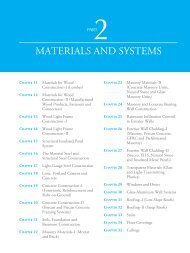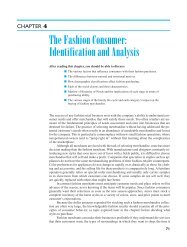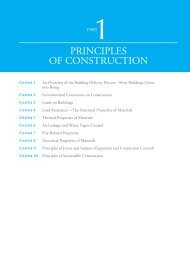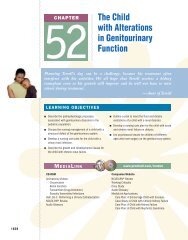Baldwin/Whiteside: Introduction to Contracts - Pearson
Baldwin/Whiteside: Introduction to Contracts - Pearson
Baldwin/Whiteside: Introduction to Contracts - Pearson
You also want an ePaper? Increase the reach of your titles
YUMPU automatically turns print PDFs into web optimized ePapers that Google loves.
Chapter Six<br />
_________________<br />
DISCHARGE OF<br />
THE CONTRACT<br />
_________________<br />
At this point, your students may be wondering if any contract is ever executed. So remind them that the<br />
good faith element of the UCC is based on the concept that each party wants the contract <strong>to</strong> succeed and<br />
that each party enters in<strong>to</strong> the contract with the goal of its being carried out as planned.<br />
Then you can segue in<strong>to</strong> the most common discharge: performance. Each party performs as expected,<br />
and all is well. We like <strong>to</strong> teach complete and substantial performance with the examples of goods<br />
packaged differently. While complete performance may be delivery of five 10-pound bags, delivery of<br />
ten 5-pound bags may be accepted, if the buyer agrees, as substantial performance. You should explain<br />
that buyer may also treat this substitution as a breach.<br />
As we mentioned earlier, news of the day is a good source of examples of impossibility and commercial<br />
frustration. Ask the students <strong>to</strong> bring an example <strong>to</strong> the next class.<br />
Breach of the contract is a term with which most students will be familiar. You will have <strong>to</strong> explain the<br />
terms “complete breach” and “anticipa<strong>to</strong>ry breach.”<br />
Suggested Test Questions for Chapter Six<br />
1. What are four ways in which a contract may be discharged? [Performance, nonperformance,<br />
agreement, and operation of law.]<br />
2. List and discuss three examples of nonperformance. [Impossibility, commercial frustration,<br />
and breach.]<br />
3. True or false: A release should be in writing and supported by consideration. [True.]<br />
4. Explain the difference between a release and a rescission. [One party may unilaterally release.<br />
All parties must consent <strong>to</strong> a rescission. A release should be in writing, whereas a rescission<br />
might be verbal, depending on Statute of Frauds and UCC requirements.]<br />
5. True or false: All parties involved must agree <strong>to</strong> a release. [False.]<br />
6. True or false: All parties involved must agree <strong>to</strong> a rescission. [True.]<br />
7. True or false: All parties involved must agree <strong>to</strong> an accord and satisfaction. [True.]<br />
8. True or false: All parties involved must agree <strong>to</strong> a novation. [False.]<br />
9. Which of the following may be made unilaterally by one party?<br />
(a) Accord and satisfaction<br />
(b) Rescission<br />
[c] Release<br />
10. A novation requires all of the elements listed below except<br />
(a) consent of the obligee<br />
(b) consent of the new obligor<br />
15
















